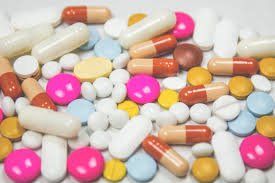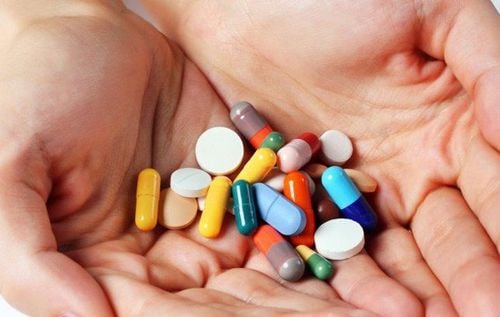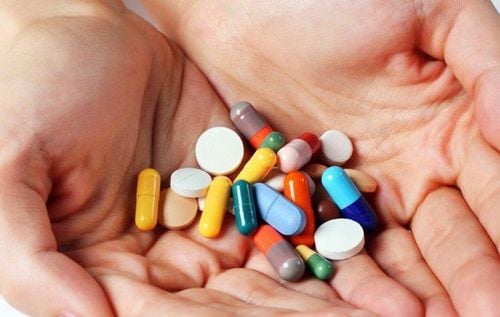This is an automatically translated article.
In the current situation of increasing antibiotic resistance, it is extremely urgent to understand the correct use and usage of antibiotics. This article will provide some important information about the antibiotic Mycobutin so that consumers can minimize possible dangerous consequences.
1. What does Mycobutin do?
With the active ingredient rifabutin, Mycobutin is often used alone or with another medication to help prevent or treat some serious infections. Rifabutin is known as a rifamycin antibiotic, which works by stopping the growth of bacteria. Therefore, Mycobutin is only specific to bacteria and has no effect on viral infections (such as the common cold, flu). To avoid antibiotic resistance, taking any antibiotic when it's not needed or isn't indicated can make it ineffective for future infections.
Thuốc Mycobutin đóng vai trò điều trị các bệnh nhiễm trùng
2. Notes when using Mycobutin
Mycobutin should be prescribed by a doctor based on your medical condition; Contraindicated in people with hypersensitivity to any of the ingredients. Usually, the dosage depends on your medical condition, weight, drug interactions, and response to treatment. Most people tolerate Mycobutin by mouth, once or twice daily, with food if you have an upset stomach. For the treatment of tuberculosis, Mycobutin may be prescribed only twice a week.
Remember to continue taking this medicine until the prescribed amount is exhausted, even if the disease symptoms improve and disappear. Stopping the medication too soon or skipping a dose can cause the bacteria to continue to grow, leading to the infection returning and more difficult to treat.
Before taking Mycobutin, tell your doctor if you:
Are allergic to the drug or to other rifamycins (such as rifampin); or any other allergies. Have a medical history, especially: Kidney disease, liver disease, blood disorder (porphyria). Are taking any pharmaceutical products including prescription drugs, over-the-counter medicines and herbal products. During pregnancy, Mycobutin should be used only when clearly needed. Therefore, if you plan to become pregnant, are pregnant or breast-feeding, discuss the risks and benefits of the medication with your doctor in detail.
3. Side effects of the drug Mycobutin
Practically not all Mycobutin users experience side effects. Therefore, you should listen to your body and immediately contact medical facilities when you see any unusual signs happening to you, typically:
May occur diarrhea, stomach pain, changes in appetite or nausea/vomiting. Easy bleeding/bruising, new signs of infection (such as fever, persistent sore throat/cough), muscle weakness/pain, joint pain/swelling, eye pain/redness, vision problems, pain/ chest tightness, persistent nausea/vomiting, unusual weakness/fatigue, dark urine, yellowing of eyes/skin Any signs of a serious allergic reaction, including: rash, itching/swelling ( especially face/tongue/throat), severe dizziness, trouble breathing. Mycobutin may cause urine, sweat, saliva, or tears to turn orange-brown. This side effect is usually harmless and goes away when the medication is stopped. However, dentures and contact lenses can become permanently stained.
One of the rare side effects that can occur is diarrhea caused by Clostridium difficile (a drug-resistant bacteria). This condition may occur during treatment or weeks to months after stopping treatment. However, unless directed by a doctor, do not use anti-diarrheal drugs if you have any of the following symptoms because these products can make the disease worse. Contact your doctor if you have: Persistent diarrhea, stomach or stomach pain/cramps, blood/mucus in your stool.

Thuốc Mycobutin có thể gây ra tình trạng đau dạ dày
4. Drug interactions
Drug interactions can change the way Mycobutin works or increase your risk of serious side effects. This document does not cover all possible drug interactions, so keep a list of all products you are using (including prescription/over-the-counter drugs and herbal products) and share them with your doctor. doctor. Never start, stop, or change the dose of any medication without your doctor's approval.
Some products that may interact with Mycobutin include: azole antifungals (such as fluconazole, itraconazole, voriconazole), ciprofloxacin, delavirdine, macrolide antibiotics (such as clarithromycin).
Mycobutin may speed up the removal of other medicines from your body that affect how they work. Some of the drugs affected include aprepitant/fosaprepitant, lurasidone, phenytoin, ranolazine, suvorexant, tacrolimus, tasimelteon, anticoagulants (such as warfarin), calcium channel blockers (such as diltiazem, verapamil), certain end products Certain combinations are used to treat chronic hepatitis C (ombitasvir/paritaprevir/ritonavir. Mycobutin may decrease the effectiveness of hormonal birth control such as the pill, patch, or ring.) Mycobutin can also make live bacterial vaccines (such as typhoid vaccine) inactive.So do not get vaccinated/vaccinated while using this medicine unless your doctor tells you to.
Please dial HOTLINE for more information or register for an appointment HERE. Download MyVinmec app to make appointments faster and to manage your bookings easily.
Reference source: webmd.com













